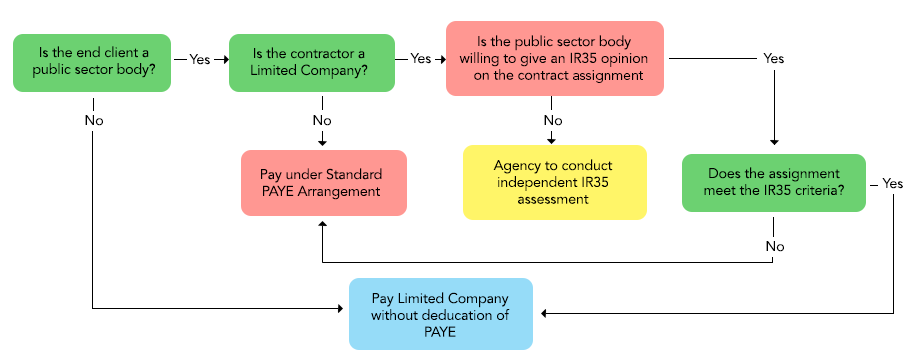
Despite opposition from contractors and employers alike, the new updates to IR35 will come into effect in April 2017 and this is likely to have a huge impact on UK recruitment agencies who employ contractors. But before digging into to the whys and wherefores, let’s understand what IR35 is, what the new regulations stipulate and how that might affect you as a public sector contract recruiter in the coming months.
What is IR35?
In April 2000, the government introduced the new IR35 ostensibly to combat employment tax avoidance by contractors working through intermediaries, such as Personal Service Companies (PSC). These “disguised employees” often worked long term contracts for employers whilst bypassing a large percentage of tax and NICs. IR35 aimed to ensure contractors paid a similar amount to those self-employed and directly employed.
However, the responsibility lay with the individual contractor to decide whether they fell “inside IR35” and, due to the vast amount of work this generated for HMRC, it has been impossible to enforce and remained largely ineffective. In fact, the HMRC recently estimated that, “PSC’s non-compliance with IR35 is soaring at a rate of 90%.” In monetary terms, this employment tax avoidance is costing the Exchequer approximately £430m each year. Therefore, it is no surprise that there has been a concerted effort to remedy this in the upcoming regulation update. What does come as a surprise, to some, is how the government have proposed to do this.
How is IR35 changing?
Although the reforms were intended to be up for discussion, little has changed since the initial proposition was heard in early 2016. The section that has caused most debate in the recruitment industry stipulates that the burden of responsibility for ensuring that PSCs pay the correct tax and NICs now lies with the employer or the organisation who pays the salary.
This means that if your agency supplies contractors to the public sector, such as government departments, NHS, schools, BBC and publically owned companies, as of April 2017, it will be your responsibility to decide whether your contractors fall inside IR35 and are eligible for the increased tax and NICs deductions.
To help the HMRC police the new reforms, the government has planned the introduction of improved IR35 tests and a new digital tool. Suffice to note that if an agency is found to be negligent to the new laws, there will be steep penalties to pay.
What could this mean for the future?
In the immediate future, it looks as if the contractors will suffer the most, facing an average 13% income drop, according to Deloitte. As an example, Deloitte stated that if a contractor was earning £500 a day for 42 weeks, this would equate to a take home salary of £70,988. Under the new laws, their take home would fall to £61, 553.
Upon hearing the proposal back in March 2016, contractors reacted vehemently, with more than half the PSCs, 26,000 workers, vowing to quit if the law came into effect. Another theory is that contractors will have “no choice but to increase their daily pay rate” to compensate for any additional tax liability. Both of these eventualities would evidently have an adverse effect on employers, recruitment agencies and the public sector itself, which currently contributes £3.5 billion to the UK economy.
There are many who also predict that the new IR35 laws are being tested on the public sector and, depending on its success,will likely be extended to the private sector. John Chaplin, Executive Director at Ernst and Young, says that HMRC is using the public sector as “guinea pigs” and it’s only a matter of time before it impacts all UK contractors.
What should your agency do?
It is clear that the reformed IR35 will shake up the public sector and cause some alarming issues for recruitment agencies across the UK. However, the most effective way to prepare is neatly summarised by John Chaplin who recommends meeting technology with technology to, “drive efficiencies, such as in the policy creation process, and undertaking staff training and potentially client training too.” In this way, technology can be your safety net whatever the ensuing outcomes of the new regulations may be.
IR35 New Process Overview

To support our customers with the IR35 changes we will be releasing an update to Eclipse Recruitment Manager 4 software in April 2017.
